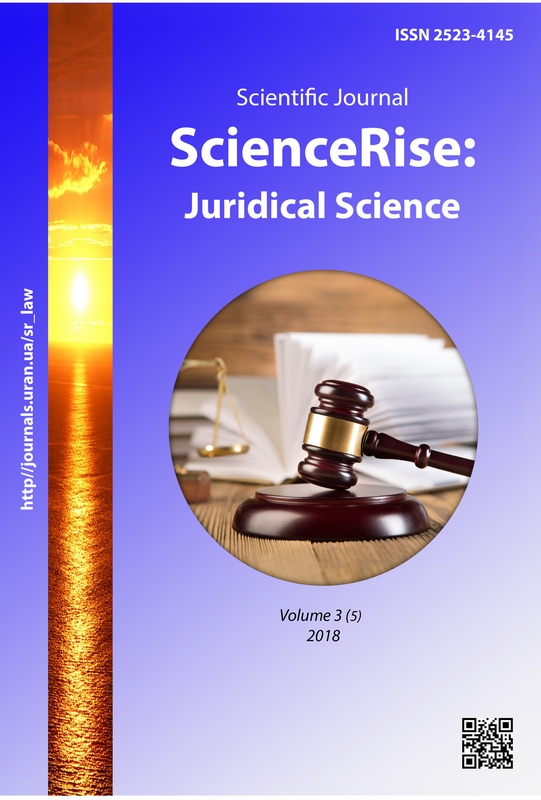Legal subjectity in private law: categorical-conceptual cognition in the context of general theory of law
DOI:
https://doi.org/10.15587/2523-4153.2018.143267Keywords:
category «legal subjectity», private law, private legal subjectity phenomenon, notion «private legal subjectity»Abstract
The features of private legal subjectity and all other private-law phenomena correspond with the peculiarities of objects and methods of branches of private law and, at the same time, with the system of principles inherent in the whole sphere of private law.
By volume and content private legal subjectity is "universal" for individuals but "special" for legal entities with minimum acceptable restrictions. The format of "exclusive legal subjectity" is produced outside of private law and peculiar to the subjectity of public origin.
Elements of private legal subjectity, marked with notions "legal capacity", “delictual capacity and "active capacity", are endowed with a dispositive mode of implementation and acquire some special content, which causes a corresponding change in their structural and functional relationship. In particular:
– in the structure of private legal subjectity dominates the "legal capacity", whose implementation is provided by the "active capacity" of subjects of private law. At the same time, the legal capacity of a legal entity, unlike the legal capacity of natural person, should not be lost under any circumstances, and that is why its presence is guaranteed by the legislation and practice of law enforcement;
– in the structure of delictual capacity of private law subject its passive side is accentuated, which is aimed mainly at compensation of damage at the expense of the offender's resources. The active side of delictual capacity of private law subject usually is weakened and is not compulsory in execution, since it, as well as private legal subjectity in general, is implemented in a dispositive format and often is being under an influence of a positive subjectivity of the participants of the relevant legal relations.
However, the loss of a special subjective connection that previously took place between the parties to private law relation can powerfully strengthen the active side of private law delictual capacity.
The notion of "private legal subjectity" denotes the kind of legal subjectity, given by an objective law to subjects who, within the limits of the current legal order, realize and protect their private interests, namely:
1) to natural persons;
2) to legal entities;
3) to associations of above persons, endowed partial legal subjectity to preserve and develop their own identity
References
- Shevchenko, Ya. M. (Ed.) (2009). Subiekty tsyvilnoho prava [Subjects of civil law]. Kharkiv: Kharkiv yurydychnyi, 632.
- Tarasov, O. V. (2014). Subiekt mizhnarodnoho prava: problemy suchasnoi teorii. Kharkiv: Pravo, 512.
- Vatras, V. A. (2008). Subiekty simeinykh pravovidnosyn [Subjects of family relationship]. Kyiv, 19.
- Kharytonova, O. I., Kharytonov, Ye. O. (2005). Dykhotomiia «publichne pravo–pryvatne pravo» ta deiaki pytannia vyznachennia struktury natsionalnoho prava // Universytetski naukovi zapysky, 3 (15), 6–11.
- Borysova, V. (2013). Tendentsii rozvytku tsyvilnoho prava yak haluzi pryvatnoho prava. Pryvatne parvo, 1, 81–93.
- Maidanyk, R. (2013). Tsyvilne pravo yak sfera pryvatnoho prava Ukrainy. Pryvatne parvo, 1, 65–80.
- Kostruba, A. (2015). Kompensatsiinyi kharakter yurydychnykh faktiv u mekhanizmi prypynennia tsyvilnykh pravovykh pravovidnosyn. Visnyk Natsionalnoi akademii pravovykh nauk Ukrainy, 3 (82), 68–78.
- Entsyklopedycheskyi slovar T-va «Br. A. i Y. Hranat i K». Vol. 30 (1915). Petrohrad, 479.
- Michurin, Ye. O. (2017). Tsyvilistyka v suchasnii yurysprudentsii. Visnyk Natsionalnoi akademii pravovykh nauk Ukrainy, 2 (89), 110–119.
- Kolodii, A. M. (2012). Pryntsypy prava: geneza, poniattia, klasyfikatsiia ta realizatsiia. Almanakh prava, 3, 42–46.
- Dihesty Yustyniana (2002). Moscow: Statut, 584.
- Kuznietsovа, N. S. (Eds.) (2008). Pravova systema Ukrainy: istoriia, stan ta perspektyvy. Vol. 3. Tsyvilno-pravovi nauky. Pryvatne parvo. Kharkiv: Pravo, 640.
- Bordeniuk, V. (2014). Poniattia terytorialnoi hromady yak subiekta tsyvilnoho prava Ukrainy. Pravo Ukrainy, 12, 189–197.
- Pervomaiskyi, O. O. (2003). Uchast terytorialnoi hromady u tsyvilnykh pravovidnosynakh [Partisipation of territorial community in civil legal relations]. Kharkiv, 200.
Downloads
Published
How to Cite
Issue
Section
License
Copyright (c) 2018 Volodymyr Sichevliuk

This work is licensed under a Creative Commons Attribution 4.0 International License.
Our journal abides by the Creative Commons CC BY copyright rights and permissions for open access journals.
Authors, who are published in this journal, agree to the following conditions:
1. The authors reserve the right to authorship of the work and pass the first publication right of this work to the journal under the terms of a Creative Commons CC BY, which allows others to freely distribute the published research with the obligatory reference to the authors of the original work and the first publication of the work in this journal.
2. The authors have the right to conclude separate supplement agreements that relate to non-exclusive work distribution in the form in which it has been published by the journal (for example, to upload the work to the online storage of the journal or publish it as part of a monograph), provided that the reference to the first publication of the work in this journal is included.









